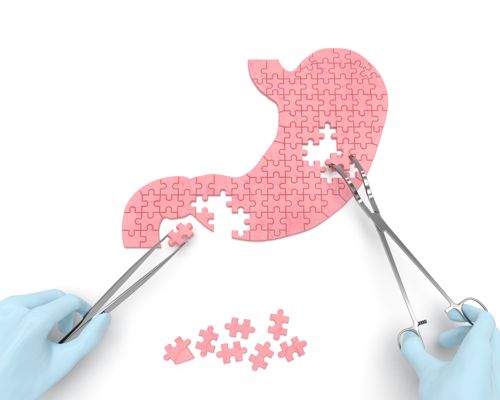Gastric Bypass
Gastric Bypass is surgery that helps you lose weight by changing how your stomach and small intestine handle the food you eat.
After the surgery, your stomach will be smaller. You will feel full with less food. The food you eat will no longer go into some parts of your stomach and small intestine that absorb food. Because of this, your body will not get all of the calories from the food you eat.
Description
You will have general anesthesia before this surgery. You will be asleep and pain-free.
There are 2 steps during gastric bypass surgery:
- The first step makes your stomach smaller. Your surgeon uses staples to divide your stomach into a small upper section and a larger bottom section. The top section of your stomach (called the pouch) is where the food you eat will go. The pouch is about the size of a walnut. It holds only about 1 ounce (oz) or 28 grams (g) of food. Because of this you will eat less and lose weight.
- The second step is the bypass. Your surgeon connects a small part of your small intestine (the jejunum) to a small hole in your pouch. The food you eat will now travel from the pouch into this new opening and into your small intestine. As a result, your body will absorb fewer calories.
Gastric bypass can be done in two ways.
- With open surgery, your surgeon makes a large surgical cut to open your belly. The bypass is done by working on your stomach, small intestine, and other organs.
- Another way to do this surgery is to use a tiny camera, called a laparoscope. This camera is placed in your belly. The surgery is called laparoscopy. The scope allows the surgeon to see inside your belly. In this surgery:
- The surgeon makes 4 to 6 small cuts in your belly.
- The scope and instruments needed to perform the surgery are inserted through these cuts.
- The camera is connected to a video monitor in the operating room. This allows the surgeon to view inside your belly while doing the operation.
Advantages of laparoscopy over open surgery include:
- Shorter hospital stay and quicker recovery.
- Less pain.
- Smaller scars and a lower risk of getting a hernia or infection This surgery takes about 2 to 4 hours.
Gastric Bypass Results
Generally, you stay at the hospital after gastric bypass surgery is either two or three days. Patients can return to their regular routine and activities in 2 to 3 weeks. Very few patients may have complications after the operation. In order to avoid this, you can consult our surgeons’ expertise. Furthermore, taking nutritional supplementation and regularly checking your blood level are useful measures to decrease the likelihood.
Gastric bypass and other weight-loss surgeries — known collectively as Bariatric surgery — involve making changes to your digestive system to help you lose weight. Bariatric surgery is done when diet and exercise haven't worked or when you have serious health problems because of your weight. Some procedures limit how much you can eat. Other procedures work by reducing the body's ability to absorb nutrients. Some procedures do both. While bariatric surgery can offer many benefits, all forms of weight-loss surgery are major procedures that can pose serious risks and side effects. Also, you must make permanent healthy changes to your diet and get regular exercise to help ensure the long-term success of bariatric surgery.
How Much Does Gastric Bypass Cost In Turkey?
Costs vary according to the reason for the surgery and its complexity. Factors influencing cost include: Your total cost, therefore, may include the likes of the surgeon’s fee, prescriptions for medication, post-surgery garments, medical tests, surgical facility costs, and anesthesia fees. Prices for a Gastric Bypass will differ from patient-to-patient and surgeon-to-surgeon, depending on numerous factors. This includes the geographic location of the office, the type of procedure used, and the experience of the surgeon. The surgeon’s level of experience and your comfort with him are just as critical as the final cost of the Gastric Bypass surgery.
The cost of the medical trip includes:
1- Transport service: A car and a driver will be with you throughout the medical trip, all transfers between the airport, hotel, hospital.
2- The translation service: includes a translator who will accompany you to translate into the French language (English, Russian, Arabic, Spanish).
3- It includes all the analyses, examinations and blood tests before the operation to ensure your state of health and your preparation for the operation.
4- Includes the cost of the process itself.
5- Nights at the hospital - Hospitalization.
6- It includes all the necessary medications and treatments for the recovery period after the operation.
7- It includes the medical supplies needed after the operation. Including corset (if patient has undergone liposuction and BBL) The silicone device for the nose (if the patient has undergone rhinoplasty).
8- It includes all visits and checks with the doctor after the operation to monitor the state of your health.
For more information, please contact us.





